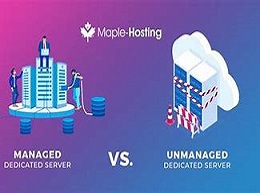
Managed vs. Unmanaged Hosting: Which Is Right for You?
Choosing the right hosting solution is a pivotal decision for your online presence. Among the myriad options, the managed vs. unmanaged hosting dilemma often perplexes website owners. This guide aims to demystify the complexities, offering insights into the characteristics, benefits, and drawbacks of both hosting types. Armed with knowledge, you'll be better equipped to make an informed decision that aligns with your digital ambitions.
Section 1: Understanding Managed Hosting Grasp the concept of managed hosting, where hosting providers take on the responsibility of server management, allowing you to focus on your website's content and growth.
1.1 Comprehensive Server Management: Explore the depth of services offered by managed hosting, including server setup, maintenance, security, and performance optimization.
Example: E-CommerceSuccessStory.com thrives on managed hosting, benefiting from automated updates, security protocols, and 24/7 support for its high-traffic online store.
1.2 Proactive Support and Monitoring: Understand the value of proactive support and monitoring provided by managed hosting, ensuring immediate issue detection and resolution.
Example: TechInnovateSolutions.com experiences minimal downtime due to the vigilant monitoring and swift support offered by its managed hosting provider.
Section 2: The Benefits of Managed Hosting Explore the advantages that make managed hosting an attractive choice for businesses and individuals seeking a hassle-free hosting experience.
2.1 Time and Resource Savings: Save time and resources by delegating server management to experts, allowing you to focus on content creation and business growth.
Example: BloggingPros.com flourishes with managed hosting, redirecting its energy towards producing quality content, resulting in a growing readership.
2.2 Enhanced Security Measures: Benefit from robust security protocols implemented by managed hosting providers, safeguarding your website against potential threats.
Example: FinancialGuardianHub.com relies on managed hosting for its financial advice platform, ensuring the utmost security for sensitive user information.
Section 3: Exploring Unmanaged Hosting Understand the nature of unmanaged hosting, where users have full control over server configurations, software installations, and overall server management.
3.1 User Autonomy and Control: Explore the autonomy unmanaged hosting provides, allowing users to customize server configurations and software installations according to their preferences.
Example: DIYTechEnthusiast.com thrives on unmanaged hosting, tailoring server settings to accommodate its unique tech-related content and applications.
3.2 Responsibility for Server Management: Acknowledge that with unmanaged hosting, users bear the responsibility of server management, including updates, security, and troubleshooting.
Example: IndependentBloggerPro.com embraces unmanaged hosting, enjoying the flexibility to troubleshoot and experiment with various server configurations.
Section 4: Assessing the Drawbacks of Unmanaged Hosting Explore the challenges associated with unmanaged hosting, requiring users to possess technical expertise and invest time in server management.
4.1 Technical Expertise Required: Understand that unmanaged hosting demands a certain level of technical expertise to handle server configurations, software updates, and issue resolution.
Example: StartupTechInnovator.com faces challenges with unmanaged hosting, prompting a switch to managed hosting for better support and expertise.
4.2 Time and Learning Curve: Recognize the time investment required to learn and manage the intricacies of server configurations and troubleshooting associated with unmanaged hosting.
Example: AspiringDeveloperHub.com experiences a steep learning curve with unmanaged hosting, opting for managed hosting to focus on software development instead.
Section 5: Making the Right Choice for Your Needs Navigate the decision-making process by assessing your website's requirements, technical proficiency, and long-term goals.
5.1 Considerations for Managed Hosting: Evaluate your need for hands-off server management, robust support, and time savings, making managed hosting ideal for content-focused websites.
Example: CreativeAgencyPro.com thrives on managed hosting, allowing its team to concentrate on delivering exceptional design services without server distractions.
5.2 Considerations for Unmanaged Hosting: Assess your technical proficiency, desire for complete control, and willingness to invest time in server management, making unmanaged hosting suitable for tech-savvy users.
Example: DIYTechGuru.com flourishes with unmanaged hosting, leveraging full control for experimental tech projects and unique server configurations.
The managed vs. unmanaged hosting decision hinges on your website's nature, your technical proficiency, and your long-term goals. By delving into the characteristics and real-world examples of both hosting types, you're now equipped to make an informed choice that aligns with your digital ambitions. Whether you opt for the ease of managed hosting or the autonomy of unmanaged hosting, this decision propels your online presence towards a future of seamless performance and growth. Welcome to the realm where hosting choices align with your aspirations – a digital domain tailored for your success!